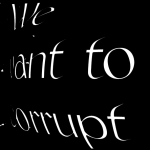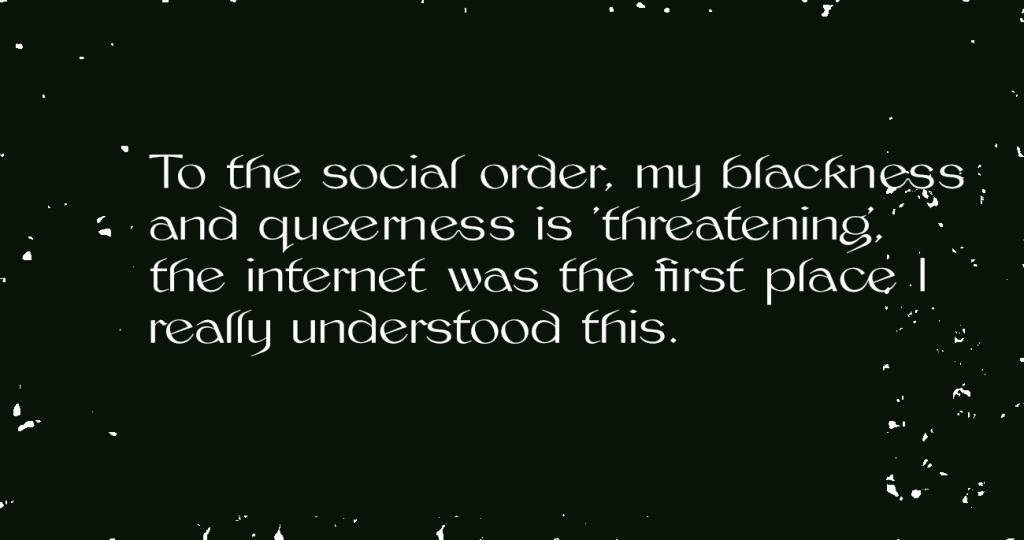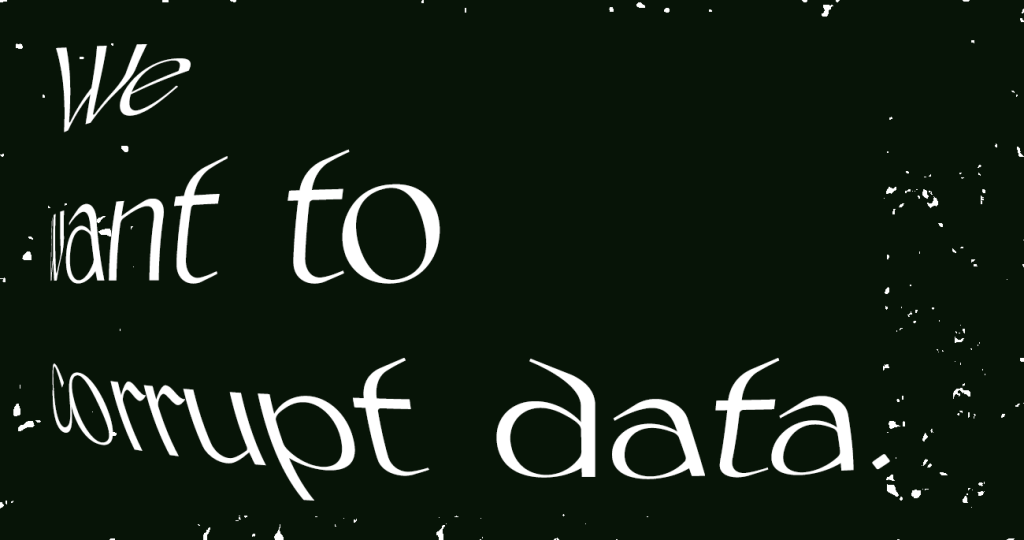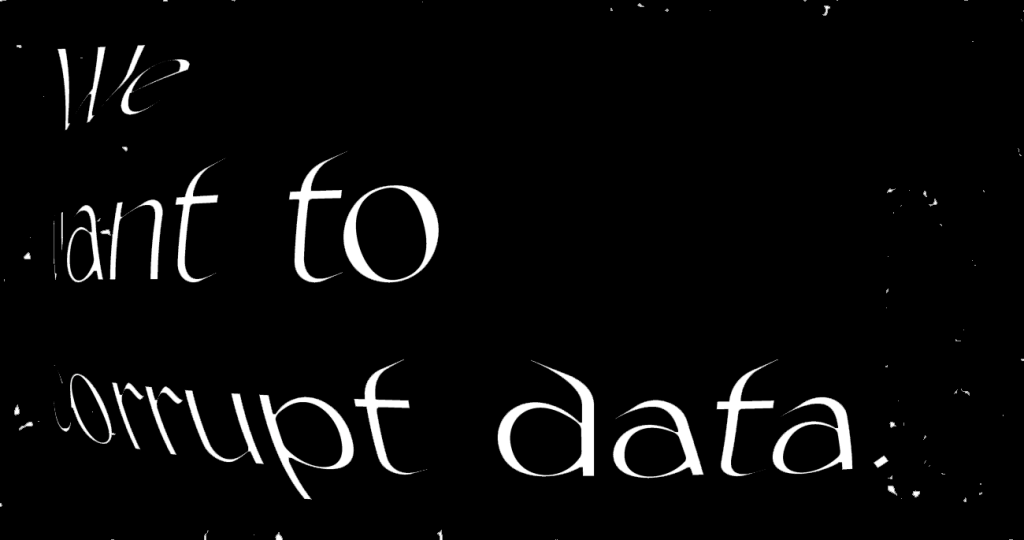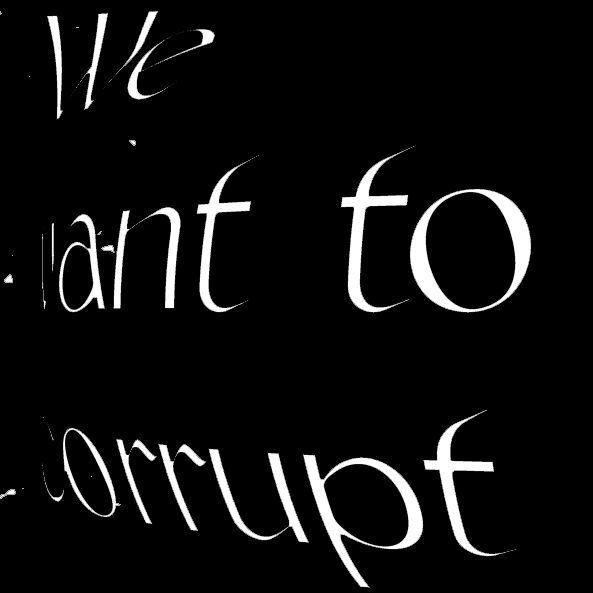‘Maybe that’s the first experience of the Internet: that moment it stops being “the Internet” and just becomes another thing/part of living.’
Hamishi Farah, in Towards a New Digital Landscape
I was 14 years old when the image of Sandra Bland in police custody began to circulate on Twitter back in 2015. She later died under the watch of the police. I had recently begun my foray into using social media. It wasn’t as if I’d had no exposure to the internet prior – as a digital native it was a part of my everyday life – but suddenly, the world and its violences buzzed at the tips of my fingers, forcing me to pay attention in a way I’d never had to prior.
My Blackness felt increasingly present after Bland’s death – I wasn’t unaware of it, but knowing that there was a likelihood that it could be my cause of death was a reckoning I struggled with as a teen. I watched it all unfold – scrolling through the thousands of images of her, the body-cam footage of the police stop she was involved in, the tweets claiming she’d died before her mugshot was taken – taking apart each pixel of the image in meticulous detail.
With Bland’s case, alongside the many others we’ve seen documented online – the reach that the internet provides forms a large part of these stories. I think about Philando Castile, Alton Sterling and the violence that has been brought to the front of the public consciousness through virality. Entire anti-racist movements operate off the back of internet activism, videos of racist police treatment continue to go viral – bringing concerns from the Black community about the inefficacy of policing to the fore – instead of relegating anti-black violence to quotidian happenings to be explained away by the Right (they deserved what came to them) or subtly reinforced by liberals (we need the police, despite their initial function, violent present actions and inevitable future of over-policing and the persecution of Black communities).
There’s now a steadfast link between those injustices and online discourse – they make their ways to our devices almost instantly – as a Black person who sees this and watches discourses about their validity unfold – where do I fit in?
In retrospect, my relationship with the internet has always been troubled somewhat by both my blackness and my queerness. In her 2020 book, Glitch Feminism: A Manifesto, Legacy Russell notes that:
‘All technology reflects the society that produces it, including its power structures and prejudices. This is true all the way down to the level of the algorithm.’
Life outside the online world can’t be separated from the spaces we move across on the internet. The way that my body is perceived (and subsequently pathologized) in real-time is tied to the anti-blackness life offline breathes with. Online, I’m Russell’s idea of a ‘glitch’ – a body that is impossible to categorise or fit neatly within neo-liberal marketing strategies and algorithms of the digital space. At the time of Bland’s passing, I didn’t have the language to decipher the rage, alienation and fear that surged through me at the sight of those tweets. To the social order, my blackness and queerness is ‘threatening’, the internet was the first place I really understood this.
Claiming The Framework of Failure
Where to now? Or at least, as Russell puts it:
‘What does it mean to find life – and to find ourselves – through the framework of failure?’
The internet has been indispensable in making the precarity of Black life hyper-visible, but it’s still a battleground to be fought and won. In 2022, four black teenagers were convicted of conspiracy offences due to a group chat where they expressed their pain and anger after their close friend was murdered. The promise of end-to-end encryption must be scrutinised when private messages can land you in prison.
The internet, with its possibilities, fads and talking points – continues to be a space where Black people, organisers and other marginalised groups are threatened by state surveillance. Tweet something too radical about the injustices you face? You’re on a watch list. Seen at a protest? That’s intel. There’s a risk of liberatory aims being sabotaged by liberals, informants and trolls who seek to isolate and divide political demands into niche categories that pit us against one another along the lines of gender, race, and class.
‘The internet has shifted the organising landscape with regard to the circulation of radical texts and the capacity for widespread political education.’ Feminist author, organiser and PhD student Lola Olufemi tells me over Zoom. ‘This also means increased surveillance of radical movements. Companies spy, spread disinformation and utilise data in ways that serve counterrevolutionary interests.’
While the threat of surveillance both online and offline grows, how can we resist? Russell writes:
‘We want to corrupt data. We want to fuck up the machine. Infectious, viral, we will tear it all down. We recognize that in this breaking, there is a beginning.’
How do we bend a system that forces us into categories for the sake of capitalist accumulation and the dulling of consciousness until it shatters under the weight of our thumbs?
My intelligibility in offline space is of integral use in this breaking. Many queer people, including myself, grew closer to themselves online – in spite of trolling, harassment and debate about whether we should even exist at all. Our strident oppositions of the categorisation that cisheteropatriarchy seeks to consolidate are also of use in the online space, as we burrow our way into the nooks of the internet in search of solidarity. We’ve been breaking the internet since its inception. The relational aspects of this self-discovery – forums, group chats – are integral to bringing the online space closer to the idea of a ‘digital commons’ that cyberfeminists strive towards.
Compounded Nihilism
While this online discovery and community building has been integral to strengthening offline queer communities and organising – the development of online spaces has occurred in tandem with the gutting of offline community spaces, especially in the UK. This morphing of the social landscape cannot be divided from the increase in dangerous ideology and radicalisation online, especially in trans exclusionary (TERF) and incel communities.
Olufemi notes the dual character of consciousness raising online, saying: ‘On the internet you can find all forms of critical information… You can find community in reading groups, forums, blogs and you can consolidate a specific analysis of the world that is one of relation,’
But she warns that fundamentally anti-relational perspectives can develop as a result of heavy internet use in lieu of offline community space. ‘You can completely do the opposite – compound nihilism and other forms of fascistic or negative relation which the internet can help consolidate’
When given less and less reason to go outside, and relate with others – the internet, even with its possibilities for community building, can become increasingly insular and limiting. Take Mumsnet’s original function of sharing information between expectant and current mothers, and think about if this space was readily available to mothers in the offline space – it’s hard to tell whether these spaces would have descended into rampant TERFism in the same way that Mumsnet has.
‘In the last 20 years, the slow destruction of infrastructures of social care and the securitisation of everyday life means that there are less and less spaces for people to gather – functioning community centres are rare’ Lola notes. ‘People are increasingly being regulated back into their households and their homes – and in turn, that directs them to digital space.
‘If you had a thriving community, if you were able to access resources accessibly outside of the online space – we weren’t suffering from forms of, to quote Ruth Wilson Gilmore, “organised abandonment by the state”, I think the intensity and the fervour with which negative relation is consolidated online would lessen. There would be an incentive to leave your house and relate to people in real life – and that might provide a different way of thinking about the world.’
Liberation in the offline world directly linking to the ways that we relate online makes the case for drawing a strong throughline between the context through which the internet was born and exists – and the collapse of social infrastructure, work-based exploitation, and environmental damage that we face offline. As Russell urges:
‘The glitch traverses this [Online vs AFK] loop, moving beyond the screen and permeating every corner of our lives. It shows us that experimenting online does not keep us from our AFK selves, nor does it prevent us from cultivating meaningful and complex collaborative communities beyond our screens.’
The Internet’s Outsourced Trauma
Behind every social media platform are people keeping the servers online and moderating content. Have we considered these people beyond their ‘use’ in keeping us sharing, tweeting and clicking? Much of this work is outsourced to global ‘click’ farms, exposing swathes of people in the Global South to some of the most horrible content available online.
‘I think it’s important not to lose sight of the violence that digital space can enact. For example, short form content moderation of video on like Facebook and TikTok, where moderators are asked to sort through violent content, involves a neocolonial organisation of labour, the displacement and outsourcing of traumatising work onto racialised workers outside of the imperial core. All of the oppressive systems and organisations that exist in real life are and will always be present in internet space.’ Lola argues.
‘Those workers are at increased risk of suicide, self-harm… because their job is putting them at risk constantly and providing no other form of support. For me, that’s the starting point for thinking about freedom online.’
‘If there’s a whole new raft of digital workers, then there’s also ways in which those workers are exploited. There’s a whole new set of perverse ways that people who work in tech are using money from private equity firms to further forms of AI that restrict us rather than working to sustain life or create the conditions for liberation.’
In 2022, TIME Magazine reported on Sama, an outsourcing company that claims to provide ‘dignified digital work’ to lift thousands out of poverty. Their Nairobi based office, handling Facebook’s content moderation for Sub-Saharan Africa, has seen workers quit after being diagnosed with mental illnesses due to exposure to disturbing content and a prioritisation of productivity over the wellness of their employees.
One worker said: “The work that we do is a kind of mental torture, whatever I am living on is hand-to-mouth. I can’t save a cent. Sometimes I feel I want to resign. But then I ask myself: what will my baby eat?”
Pushing Back
This is just one of many instances of the blurred line between the online and the offline – and even more reason to understand the gains of internet organising within the context of capitalist exploitation. With the formation of online communities, their ability to connect us across borders and even through time – there’s a risk of politics online morphing into what is said rather than what is done.
Olufemi echoes this sentiment: ‘Whether we like it or not, this is a new battleground for a whole generation of thinkers and theorists – so people need to be skilled up and need to understand how the internet works…’
‘I think that that means refusing the idea that the internet provides a sense of freedom that is incapable of being remade elsewhere. I think that the question is how do we, using the internet and using the resources that we have in real life, continue to try and make forms of freedom?’
A pushing back is necessary – a counter to the current organisation of our online spaces. As Russell writes:
‘… perhaps what these institutions – both online and off – require is not dismantling but rather mutiny in the form of strategic occupation.’
Countering this organisation is a process that requires us to challenge and complicate the divide between offline and online life – and draw a connection between the miseries and possibilities for freedom that both digital and real space provides







